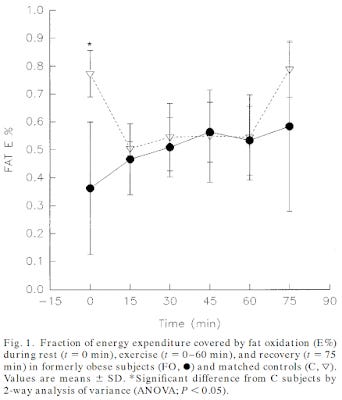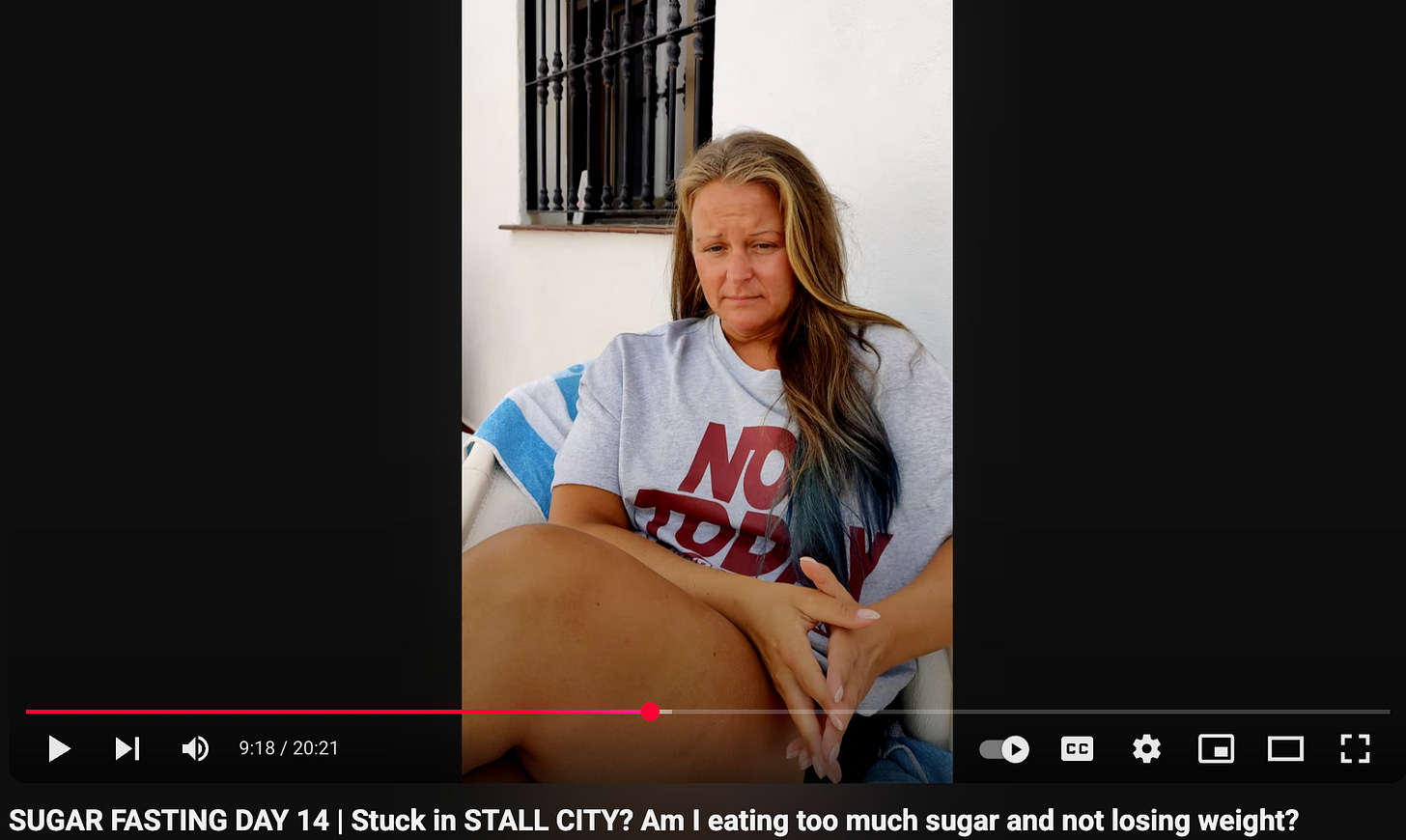Why "The Sugar Diet" is blowing up
Time to get out of "STALLLL CITYYYYY"
I so desperately did not want write this post about the “sugar diet” this week.
However, having had a number of conversations with people that are seeing pretty incredible success after they damaged their metabolisms through keto/carnivore diets, I think it's only fair to write a post that explores the new trend of eating a high sugar or an even an only sugar diet.
One of the challenges I think that is occurring with this way of eating is that everybody is just kind of regurgitating the same information, which fundamentally comes from a few people.
Instead of rehashing what everybody's already saying, I wanted to give a small opinion and overview on some of the science on why a high sugar diet might work really well for a person.
As well as digging into a few public specific cases of people who have had success with this, and then also pointing to a number of videos and conversations that are on the internet that I think are really informative.
At Patchwork we help people avoid diet & supplementation mistakes to achieve an optimal metabolism with personalized insights based on your DNA.
We’re getting ready to launch a one of its kind AI powered coach to help you achieve your metabolic health goals. We’re looking for testers! Hit reply or comment below if you’re up for trying.
So what is the sugar diet
There are two core forms of the sugar diet
Sugar Diet (Honey Diet):
Some form of breakfast through til dinner, only eat high sugar based foods. Honey, candy, fruit…no starch.
Then for dinner eat lean meat. Some people add starch, some people add veg, some people add fat.
Sugar Fasting:
Eat only high sugar based foods. That’s it. No meat, no starch, no fat.
You are fasting from everything else.
Why this works
Well first off, you might be thinking. There is no way this will work. For many, it does not. But that is the same with every dietary regimen. We all have different genetics, histories and environments.
FGF-21 (most common reason given)
The most commonly cited reason for this diet working is that by restricting protein and upping foods which put a load on your liver, your body up regulates a hormone called FGF-21.
FGF21 helps regulate energy expenditure and intake, potentially contributing to body weight management.
It enhances insulin sensitivity, improves glucose uptake in adipocytes, and can help regulate blood sugar levels.
FGF21 reduces lipid levels, including triglycerides and low-density lipoprotein (LDL) cholesterol, and increases high-density lipoprotein (HDL) cholesterol.
FGF21 can increase heat production in tissues, potentially contributing to energy expenditure.
BCAA restriction = insulin sensitivity
Another reason this diet probably works is because we know that large dietary protein loads can cause insulin resistance.
By reducing your protein intake, you are inherently undergoing BCAA restriction and thus reducing drivers of insulin resistance.
I actually think that this is one of the underlying issues with heavy meat or carnivore diets for people who are metabolically compromised.
They end up in a place where they simply can't lose any more weight and they're also struggling with pulling any energy from their existing fat stores.
Their glucose demand of their brain and the elevated stress hormones means that their fasting blood glucose slowly climbs, and I know many carnivores who have a fasting blood glucose in the high 90s.
People with CGMs can do this for themselves and confirm that when you eat sugar by itself, your blood sugar spike is very very acute, but if you eat sugar with me, your blood sugar will remain elevated for hours.
Fat restriction = insulin sensitivity
The diet is fundamentally a low fat and/or a fat restricted diet.
As you get closer to metabolic comprimization dietary fats can drive insulin resistance.
With the CGM example given above, the same goes if you eat sugar with fat. You'll know that if you eat sugar with fat (swamping), your blood sugar will remain elevated for quite a long time.
PUFA’d fat cells are pathologically hyper sensitive to insulin
Something rarely discussed but well explored by Peter, the blogger behind Hyperlipid, is that if you have eaten sufficient amounts of polyunsaturated fats (seed oils) for a long time such that the composition of your fat cells is high in polyunsaturated fats, your fat cells actually become pathologically insulin sensitive.
This means that they are more likely to take up any free fatty acids in your blood and also are more likely to prevent the burning of fat for energy.
This study in formerly obese women showed that “fat oxidation is subnormal”. I will note that dietary saturated fats change this behavior to some degree, and that formerly obese patients is an extreme - but the mechanism is the same for anyone who previously ate a standard american or high PUFA diet.
You can see in this graph above - at rest, during exercise and during recovery the formerly obese patients using much less fat to produce energy than the controls.
“Finally, the really strange thing is” that these formerly obese women have elevated free fatty acids, both at rest and throughout exercise. “If the formerly obese have all this extra lipid available, why don't they oxidise it?”
“Fat burns in the flame of carbohydrate”
Remember our discussion on how we actually make energy?
Well if you look at energy production from the view of the TCA (Krebs) cycle…
There is strong scientific evidence supporting the argument that carbohydrates are essential for efficient fat oxidation by providing oxaloacetate for the TCA cycle.
Glucose tolerance is key in aerobic metabolism, which produces sufficient oxaloacetic acid for the oxidation of acetyl CoA, and at the same time enabling free fatty acids to enter the Krebs cycle.
By being great at burning carbs, you can actually be better at burning fats.
But man thrived on meat 200,000 years ago and no one ever thrived on sugar!
Dr Ken Berry (Carnivore diet personality) actually tried to make this point or an incredibly similar one this week which struck me as a bit odd. Man 200,000 years ago also didn’t have running water or penicillin.
Anyway there is tons of historical precedent for high carbohydrate or even high sugar diets. Albeit - their teeth probably took a huge hit without the modern invention of Nano Hydroxyapatite toothpaste.
Ancient Mesopotamians
The Mesopotamian diet was diverse, with barley as the staple grain for bread and beer. However, dates were a major component, especially in southern regions like Sumer, where date palms were extensively cultivated.
Dates, containing 60-70% sugar, were a staple food, used in cooking, and even served as currency. Honey was also used to preserve fruits and as a sweetener, contributing to a diet with significant natural sugar content.
Archaeological records and texts highlight the economic and dietary importance of dates (Dates in Mesopotamia).
Polynesians
Polynesian societies, including those in Hawaii, Samoa, and Tahiti, consumed a diet rich in starchy crops like taro, yams, and breadfruit, but also included fruits high in natural sugars, such as bananas, coconuts, and sugarcane.
Sugarcane, domesticated in New Guinea around 8000 BC, was chewed for its sweetness and carried during migrations.
These fruits provided a notable sugar component to their diet, complementing their carbohydrate-heavy staples (Polynesian Diet).
Ancient Indians
The ancient Indian diet, particularly during the Indus Valley and Vedic periods, included wheat, barley, rice, and legumes, but also a variety of fruits like mangoes, bananas, and dates.
Sugarcane was cultivated as early as 4000 BC, and by 500 AD, methods to refine sugar were developed.
While refined sugar was likely a luxury, raw sugarcane and fruits contributed natural sugars to the diet, especially in later periods (Ancient Indian Diet).
The results and why this just might stick
The metabolic health space and the weight loss space in general is full of snake oil salesmen.
Every 20-something-year-old influencer has a new weight loss plan or special hack that they want to sell you. What I've come to learn is that you have to pass the fundamental bullshit sniff test for these things to work.
Very simply, when something works, people talk about it. I know this all too well with the work that we do at Patchwork.
And with the numerous people I have come across who make wildly exaggerated claims about them having solved the core reasons of obesity, say with your microbiome - Only to find people on Reddit saying they tried that protocol and it was basically nonsense.
And so here's why I dug into the sugar diet this week.
The reason why this diet I think is hitting a tipping point is because there are actually so many people that are finding that keto/carnivore/fasting/calorie counting trashed their thyroid, messed up their metabolism and they're giving this idea shot and seeing results.
Quite literally - the results speak for themselves.
I've seen many diet gurus have their egos bruised in this space this week as this diet has taken on popularity.
And you'll see more and more people come out against it, but what you have to fundamentally appreciate is that everybody just wants to be lean and not think about food.
It is actually that simple.
That is the base reason why GLP-1s have taken off. You take a weekly injection, and you get lean without thinking about food.
A naturally lean person that is not thinking about food is inherently much healthier.
See for yourself
I am not here to steal the thunder of people that are better health and great outcomes.
One of the things that personally drives me and the work that we do at Patchwork is that people are not believed by those who are supposed to believe them.
We talk to people every single day who go to their doctor with symptoms and issues, and the doctor refuses to do the blood work, prescribe the drug or refer them to the specialist they need.
Hell I did an uncivilized post on what food noise feels like, and a number of people messaged me, basically saying that it was bullshit. Side not - screw you guys.
Here's a list of people I've found to be giving really interesting insights on how they're finding this dietary protocol:
The comments on all these videos are like nothing I’ve ever seen before.












Let's hope it works haha. Not yet convinced. Remember 2 months ago the Honey Diet had the exact same hype around it, and then it turned out not to work for quite a few people including yours truly.
Im 2017 the place i worked had unlimited soda. I wanted to try OMAD but I, a person with their brain off, equated fasting with "no food" so i continued to drink 3-4 cans of soda throughout the day and would have a nice dinner of meat + starch in the evening. My stable weight moved from 210 pounds to 195 in 6 months and even though my weight fluctuated a lot after that, as low as 163lbs trying different diets and all, ive only been above 200 pounds once since then... And that was water retention after a really bad reaction to something last year.
I always thought that was a borked first attempt but its been my only weightloss that stuck with me through the last decade so maybe sugar fasting was made for me all along? Nervous to try again given i havent had soda in 5 years at this point, but I'm tempted.